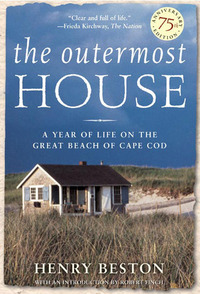You need to sign in or sign up before continuing.
Take a photo of a barcode or cover
reflective
The modern Thoreau. Instead of Concord and Walden Pond Beston spends a year (1929) in the dunes of what’s now the Cape Cod National Seashore. I’d never heard of him until he was mentioned in another book discussing dark skies and our vanishing night.
He lives alone in a cabin he had built in the dunes. He goes into town for groceries and visits the nearby coast guard detachment, who reciprocated with visits while patrolling the beach. His writing is very descriptive, almost poetic. The music of the sea. The constellations of birds. He describes the murmuration of bird formations without using that word.
He comments on everything. There’s nothing to do but observe. He’s never bored. Birds and animals take up a good portion of the book. The natural world, the environment, the weather, and climate all get his scrutiny as well. There are musings on night and darkness and an ode to the sense of smell.
His year on the beach was by no means peaceful. There were many shipwrecks and deaths along the shore. He writes too about the operations, procedures, and equipment of the coast guard. We learn these men are called “surfmen.”
It’s hard to believe this book is so unknown and it’s a shame too. I much preferred it to Thoreau.
Some great quotes:
“Be the answer what it will, today’s civilization is full of people who have not the slightest notion of the character or the poetry of night, who have never even seen night. Yet to live thus, to know only artificial night, is as absurd and evil as to know only artificial day.”
“Do no dishonour to the earth lest you dishonour the spirit of man. Hold your hands out over the earth as over a flame. To all who love her, who open to her the doors of their veins, she gives of her strength, sustaining them with her own measureless tremor of dark life. Touch the earth, love the earth, honour the earth, her plains, her valleys, her hills, and her seas; rest your spirit in her solitary places. For the gifts of life are the earth’s and they are given to all, and they are the songs of birds at daybreak, Orion and the Bear, and dawn seen over ocean from the beach.”
He lives alone in a cabin he had built in the dunes. He goes into town for groceries and visits the nearby coast guard detachment, who reciprocated with visits while patrolling the beach. His writing is very descriptive, almost poetic. The music of the sea. The constellations of birds. He describes the murmuration of bird formations without using that word.
He comments on everything. There’s nothing to do but observe. He’s never bored. Birds and animals take up a good portion of the book. The natural world, the environment, the weather, and climate all get his scrutiny as well. There are musings on night and darkness and an ode to the sense of smell.
His year on the beach was by no means peaceful. There were many shipwrecks and deaths along the shore. He writes too about the operations, procedures, and equipment of the coast guard. We learn these men are called “surfmen.”
It’s hard to believe this book is so unknown and it’s a shame too. I much preferred it to Thoreau.
Some great quotes:
“Be the answer what it will, today’s civilization is full of people who have not the slightest notion of the character or the poetry of night, who have never even seen night. Yet to live thus, to know only artificial night, is as absurd and evil as to know only artificial day.”
“Do no dishonour to the earth lest you dishonour the spirit of man. Hold your hands out over the earth as over a flame. To all who love her, who open to her the doors of their veins, she gives of her strength, sustaining them with her own measureless tremor of dark life. Touch the earth, love the earth, honour the earth, her plains, her valleys, her hills, and her seas; rest your spirit in her solitary places. For the gifts of life are the earth’s and they are given to all, and they are the songs of birds at daybreak, Orion and the Bear, and dawn seen over ocean from the beach.”
inspiring
relaxing
slow-paced
Slow at times (especially the chapter about birds), glorious at other times (especially the chapter about the storm), this was a book that celebrates Earth, its seasons, solitude, the hearty stock of Cape Cod, the ocean, and nature. Oh, and tiny house living, a century ago. :)
Loved reading this while on Cape Cod - made me not only joyful to be a part of this incredible environment but also a bit sad about the freeness of nature prior to the larger population that currently lives on the cape. A great read if you love nature books and/or learning about the cape.
The world happens everyday, everywhere. We're often forgetful whence we came and we easily dismiss that seemingly distant background which is always there – nature.
Henry Beston is the willing witness of a year round experience in the sands of Cape Cod beach. Humbled by the very spectacle of change, the author becomes one of us, and through him we see, listen, feel, smell and become united with the majesty of a world thriving with life. We follow the old rhythm of the earth as it follows the Sun, and before us nature shines: glorious, beautiful, generous, bountiful. And as it happens, we see it unfolding, as it should be, as it always does, bewildering with an elemental and transcendental beauty. This is what makes this book a masterpiece. Nature becomes the main character of a novel without narrative, where people are but silhouettes in that greater background where everything happens, everyday, everywhere.
Henry Beston is the willing witness of a year round experience in the sands of Cape Cod beach. Humbled by the very spectacle of change, the author becomes one of us, and through him we see, listen, feel, smell and become united with the majesty of a world thriving with life. We follow the old rhythm of the earth as it follows the Sun, and before us nature shines: glorious, beautiful, generous, bountiful. And as it happens, we see it unfolding, as it should be, as it always does, bewildering with an elemental and transcendental beauty. This is what makes this book a masterpiece. Nature becomes the main character of a novel without narrative, where people are but silhouettes in that greater background where everything happens, everyday, everywhere.
In 1927/28, Naturalist, Henry Beston has a small home built on a large sand dune beside the Atlantic Ocean on what is the forearm of Cape Cod. Here, he plans to study the changes the four seasons bring to fowl, fauna and people who make this place their home, even if only for a season or two. While living a solitary life, Beston documents all he observes. By the latter portion of the book the observations get a little redundant and a tad dull for the novice birder like myself. I preferred to read about the Nor' Easter's that would confine Beston to his little cottage or the men manning the Coast Guard Station who attempted to rescue hapless ships along the coastline. Yet, that said, Beston writes of every detail with wonder and amazement and had me yearning to share in his experience and really look at the amazing world we inhabit and share with birds, fish, celestial bodies, fauna and fellow humans.
This may be the book that is a life changer for me. As the days come and go, I've been oblivious to the natural world which surrounds me. I've already begun to document the butterflies that pay my garden a visit and I look forward to studying the birds who will soon stop at my bird feeder on their migratory journey to a warmer climate or those that find my backyard is the warmer climate for which they've been searching. Thank you, Mr. Beston, you've opened my eyes.
This may be the book that is a life changer for me. As the days come and go, I've been oblivious to the natural world which surrounds me. I've already begun to document the butterflies that pay my garden a visit and I look forward to studying the birds who will soon stop at my bird feeder on their migratory journey to a warmer climate or those that find my backyard is the warmer climate for which they've been searching. Thank you, Mr. Beston, you've opened my eyes.
I have a hard time focusing on naturalist writing, but I enjoyed this book! His descriptions of the ocean really struck me, and there was one particular passage about human fear of the night which I found really interesting. Good for people interested in/connected to Cape Cod.
Wow, how nice it would be to spend some time on Cape Cod.



